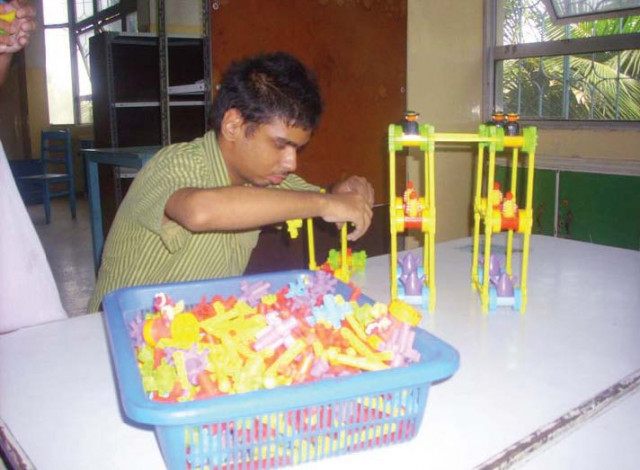Centre for mentally challenged develops its own struggle: Finances
Since Dar-ul-Khushnud is registered as a church-controlled charity, it cannot collect Zakaat.

Dar-ul-Khushnud was established 31 years ago in 1980 and is run under the Holy Trinity Church. But since it is registered as a church-controlled charity, collecting donations is not that easy. It cannot be run on Zakaat even though 95% of its students are Muslims. According to lifetime volunteer Perin Mama, they have been forced to sell two out of their four pick-up vans because of the sky-high prices of fuel and food.
The numbers do not look good. The electricity bill, worth Rs94,000, has not been paid for the last six months. Even the water bill of Rs23,000 needs to be taken care of.
The centre has around 132 children who come in two shifts on weekdays, according to the principal, Zafar Iqbal. The younger ones come in the morning and require more care while the older ones come in the afternoon shift. The younger lot is taught basic chores for personal care while the older ones are taught simple skills such as gardening, chopping vegetables and making handicrafts, candles and envelopes. Dar-ul-Khushnud picks and drops them from home and feeds them while they are at the centre.
The centre spends around Rs7,000 per month on a single child - which includes food and transport. It tries to raise funds by organising fairs and charity events. But they are not enough. Twenty-two trained teachers out of a total staff of 32 work with the children whether it is physiotherapy, occupational therapy or training them to take care of their own needs. Still, Principal Iqbal lamented that most of the time it is very difficult to help the children get jobs later on as society was not ready to accept them.
What distinguishes Dar-ul-Khushnud from other institutes is that the teachers, trainers and care-givers are personally involved with the students. The teachers eat the same food and even assist them when they need to go to the bathroom. The teachers gain the trust of the students by doing all their chores themselves.
Shani was admitted to the centre about 10 years ago. He has shown a lot of improvement and can now eat and shower by himself and even count money. His story is not very different from his fellow students who are also gradually learning to do things on their own.
Student Rajesh, for example, was extremely fond of cooking and was taken on as a kitchen boy at the Beach Luxury Hotel. Another student, Tony, is now working at the trust itself as a peon. Robert Ghouri, the father of a 20-year-old Silvia Bushra, shared that his daughter could not walk because of brain anoxia, a condition in which the brain does not get sufficient oxygen. But after six years at the centre, she has now begun to talk and express herself. The centre charges Rs7,000 per month on a single student, and asks the parents for the same amount as their fees, if they can afford it. For those who can’t, the fee is susbsidised to around Rs2,000 but even that is too much for many.
Published in The Express Tribune, November 30th, 2011.



















COMMENTS
Comments are moderated and generally will be posted if they are on-topic and not abusive.
For more information, please see our Comments FAQ